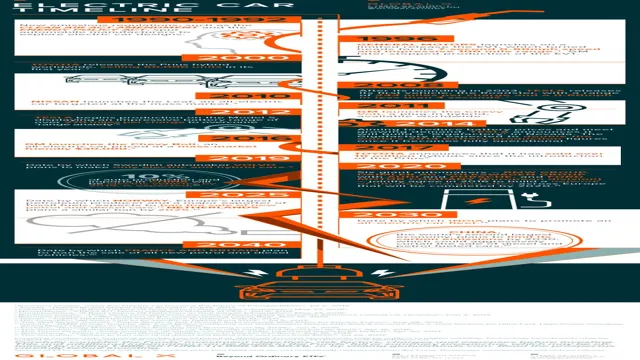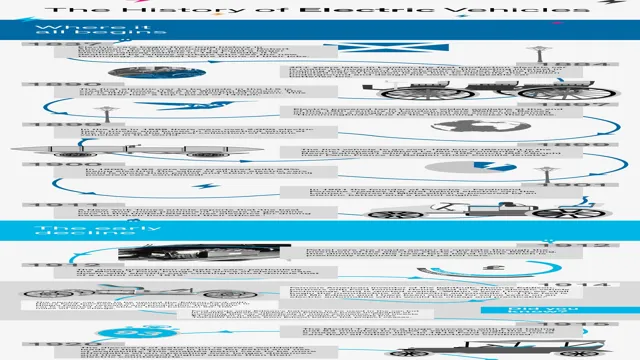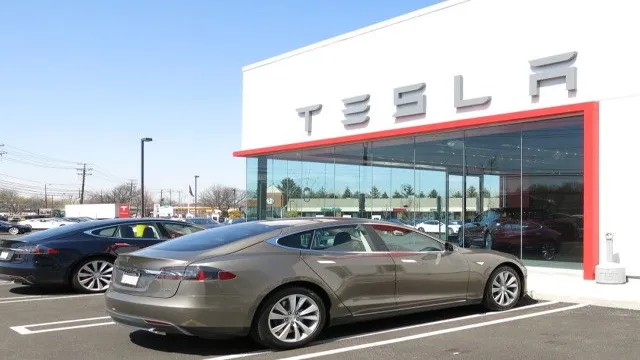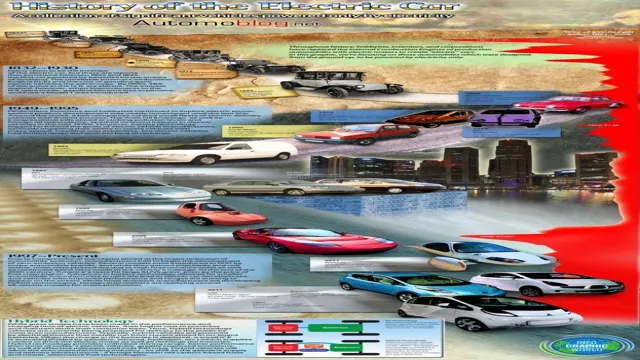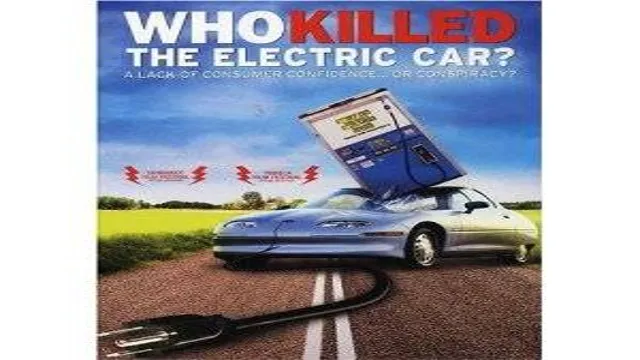The Electrifying Evolution: Tracing the Fascinating History of Electric Cars Through Time
Have you ever wondered about the electric car timeline history? With the increasing demand for electric vehicles, it’s fascinating to see how this technology has rapidly evolved over the years. The concept of electric vehicles has been around for over 100 years, but it wasn’t until recently that they became a viable option for consumers. In this blog, we’ll explore the history of electric cars, from their earliest beginnings to the current state of the industry.
So, buckle up and join us on a trip through time to discover how electric vehicles have evolved and revolutionized the automotive industry.
Early Days of Electric Cars
The history of electric cars can be traced back to the early 1800s when a Scottish inventor named Robert Anderson created the first crude electric carriage. However, it wasn’t until the late 19th century that practical electric cars were introduced to the market. In 1891, William Morrison built the first successful electric car in the United States.
The vehicle had a top speed of 14 miles per hour and could run for up to 13 hours on a single charge. Throughout the early 1900s, electric cars became increasingly popular, especially for women who found them easy to operate and maintain. However, the rise of gasoline-powered cars led to a decline in the popularity of electric cars, and by the 1920s, they were all but forgotten.
It wasn’t until the 1990s that electric cars began to make a comeback as concerns over global warming and air pollution grew. Today, electric cars are more popular than ever, and the technology continues to advance rapidly. From the humble beginnings of the electric carriage to the modern, high-tech electric vehicles of today, the electric car timeline history is one of resilience, innovation, and progress.
Late 19th Century to Early 20th Century
In the late 19th century, the world was fascinated by the idea of electric cars. There was a widespread belief that these vehicles had the potential to revolutionize the way humans traveled and powered their lives. The early days of electric cars saw various experiments and inventions, but they were largely limited by their battery technology.
At the time, batteries were heavy, expensive, and had a short lifespan. This made it difficult to create practical electric cars that could compete with gasoline-powered vehicles. However, despite these limitations, electric cars still had a loyal following and continued to be developed by pioneers such as Thomas Parker and Ferdinand Porsche.
Even though the electric car craze faded for several decades, the early groundwork laid by these innovators paved the way for the modern electric cars we see today.
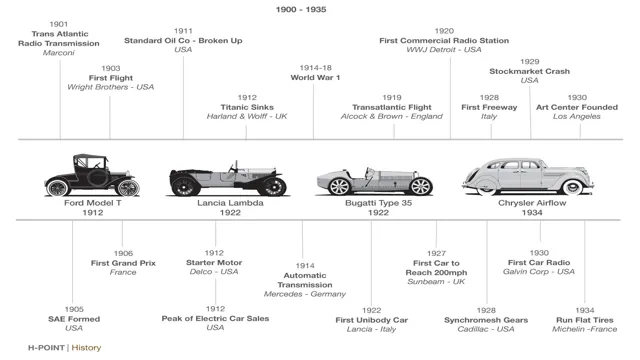
Factors That Contributed to Their Popularity
One of the major factors that contributed to the popularity of electric cars was their early days. While electric vehicles have been around for over 100 years, they were not commercially available until the late 1990s. At that time, concerns about emissions and rising oil prices were causing people to look for more environmentally friendly and cost-effective alternatives to gasoline-powered vehicles.
Additionally, improvements in battery technology, including the use of lithium-ion batteries, made electric cars more practical for everyday use. Despite initial skepticism, early adopters of electric cars praised their quiet operation, instant torque, and low maintenance requirements. As more people began to see the benefits of electric vehicles, sales started to increase, and the industry began to grow.
Today, electric cars have become even more popular as concerns about climate change and air pollution continue to drive demand for cleaner forms of transportation.
Decline of Electric Cars
Electric cars have come a long way since they were first invented in the early 1800s. However, despite a promising start, electric cars suffered a decline that lasted for several decades. The early models were plagued with problems, and their batteries were inefficient, expensive, and unreliable.
This led to the rise of gasoline-powered vehicles, which quickly dominated the market due to their better performance and lower cost of ownership. As a result, electric cars became virtually extinct by the 1920s. It wasn’t until the 1990s that electric cars made a comeback.
This was fueled by concerns over dwindling oil reserves, rising fuel costs, and environmental issues. The first modern electric car to hit the market was the GM EV1, which was introduced in California in 199 However, despite initial success, the EV1 was eventually discontinued in 2003 due to a lack of consumer demand.
Despite the decline of electric cars in the past, the current timeline of electric car history is much more promising. In recent years, electric cars have gained mainstream acceptance, thanks to advancements in battery technology, increased government support, and growing consumer awareness. Today, electric cars are seen as a viable alternative to traditional gasoline-powered vehicles, with many automakers investing heavily in their development and production.
It’s a fascinating time for the world of electric cars, and it will be exciting to see what the future holds.
Emergence of Gasoline-Powered Cars
Gasoline-powered cars have become the norm for modern transportation, but it wasn’t always this way. In the early 1900s, electric cars were a popular choice, with many advantages over their gasoline-powered counterparts. Electric cars were easier to operate, required less maintenance, and produced no emissions.
However, as more people began to own cars, gas stations became more prevalent, making gasoline-powered vehicles more convenient. Manufacturers also began to improve the technology behind gasoline-powered engines, making them faster and more powerful than electric ones. Unfortunately, the convenience and popularity of gasoline-powered cars led to the decline of electric cars.
However, in recent years, there has been a push for eco-friendly transportation, leading to a resurgence in electric cars. People are starting to realize the benefits of electric cars, not only for the environment but also for their wallets in the long run. It’s exciting to see the advancements being made in the electric car industry, and it’s clear that it has a promising future ahead.
Oil Industry’s Influence
It is no secret that the oil industry holds a considerable amount of influence over the automobile industry. Sadly, this has resulted in the decline of electric cars. The development of electric cars began with a lot of promise, with manufacturers showing off futuristic vehicles that could drastically reduce our carbon footprint.
However, the oil industry has made it challenging for electric cars to gain any traction in the market. They have put up several roadblocks, including lobbying against electric car incentives and spreading misinformation about the safety of electric vehicles. This has ultimately resulted in the decline of electric cars, leaving the world at the mercy of the oil industry.
The situation is not all doom and gloom, though, as people are beginning to see the benefits of electric cars and are starting to fight for them. With more people pushing for change, we may eventually be able to break free from the oil industry’s grip and fully transition to a greener future.
Lack of Advanced Battery Technology
Electric cars have been touted as the future of transportation, but their decline can be traced back to a lack of advanced battery technology. Simply put, current batteries cannot hold enough power to provide sufficient range for electric vehicles, nor can they be charged quickly enough to mimic the convenience of gasoline filling stations. This limitation affects not only individual consumers but also companies exploring electric delivery vehicles and buses.
Without battery technology advancements, the potential and promise of electric cars will remain unfulfilled. It’s like having a smartphone with limited storage; no matter how great the features are, the device just can’t perform at its full potential. The same goes for electric cars; without better battery technology, we’ll continue to see their slow decline in popularity.
Revival of Electric Cars
The electric car timeline history is an interesting one, with the first electric car created in the early 1800s. However, it wasn’t until the early 2000s that electric cars started gaining popularity, thanks to Tesla’s introduction of their Roadster. The Roadster was groundbreaking, as it was the first electric car to have a range of over 200 miles on a single charge.
This success sparked a revival of electric cars, with other automobile manufacturers following suit and creating their own electric vehicles. Today, electric cars have come a long way, with even more extensive ranges, faster charging times, and various models to choose from. Additionally, technological advancements have made electric cars more affordable, making them a more viable option for everyday drivers.
With the emphasis on reducing emissions and the push towards renewable energy sources, the future of electric cars looks promising.
1990s to Early 2000s: Introduction of Modern Electric Cars
In the 1990s to early 2000s, there was a revival of electric cars, marking the introduction of modern electric cars as we know them today. It was a time when the world was gradually waking up to the need for sustainable energy and the impact of fossil fuels on the environment. During this era, automakers such as Toyota, Honda, and General Motors began experimenting with hybrid and electric powertrains, resulting in the production of the Toyota Prius and GM’s EV1, among others.
While the initial reaction to these vehicles was mixed, with concerns about range and practicality, they proved to be an essential precursor for the advancements we see today. These early electric cars laid the foundation for the innovative EV technology we now enjoy, such as electric charging infrastructure, battery technology, and vehicle design. The revival of electric cars also set the stage for advancements in eco-friendly transportation, which continue to evolve to this day.
The importance of this era cannot be overstated, as it was crucial in reshaping the industry’s outlook and spawning the electric vehicles that have become a vital part of the transportation system.
2010s to Present: Expansion of the Electric Car Market
Electric Car Market The 2010s saw a significant revival of the electric car market. Factors like rising fuel prices and concerns over carbon emissions nudged automakers to focus more on electric vehicles, leading to the launch of groundbreaking models, such as the Tesla Model S. The expansion of the charging infrastructure further fueled the growth of the EV market, making it more convenient for drivers.
Governments worldwide also played a crucial role in accelerating the adoption of electric cars by introducing incentives and regulations to promote their use. While electric vehicles still constitute a small fraction of total vehicle sales, their numbers are growing at a rapid pace, indicating the shift towards a sustainable future. With advancements in battery technology and increasing consumer demand, the electric car market is expected to continue expanding, leading to a cleaner and greener future on our roads.
Future of Electric Cars
Electric car timeline history reveals a progression in the development of these vehicles, from early models in the late 1800s to today’s modern electric cars. At the beginning of the 20th century, electric cars were popular among the wealthy, but they eventually lost out to gasoline-powered cars due to issues with battery technology and infrastructure. In the 1990s, automakers began to develop electric vehicle prototypes with better performance, but they were largely unsuccessful in the market due to high costs and limited range.
However, in the last decade, electric cars have gained momentum again with the rise of Tesla and other manufacturers. We’re already seeing more affordable and practical electric cars on the market, such as the Nissan Leaf and Chevy Bolt. As battery technology continues to improve, we’ll likely see electric vehicles become the norm, with a reduced dependence on gas-powered cars.
So, it’s safe to say that the future of electric cars is bright, and we can expect to see more innovative designs and features in the coming years.
Advancements in Battery Technology and Charging Infrastructure
The future of electric cars has never looked brighter. Advancements in battery technology and charging infrastructure are quickly changing the game. With improvements in battery life and capacity, electric cars are becoming more feasible for longer distance travel.
This is largely due to the development of solid-state batteries, which have higher energy density and are safer than traditional lithium-ion batteries. Charging infrastructure is also rapidly expanding, making it easier for electric car owners to find charging stations, reduce range anxiety and increase convenience. With these developments, the electric car industry is expected to boom in the coming years, with major car manufacturers investing heavily in electric vehicle production.
Who knows, in the near future, owning an electric car could be as normal as owning a traditional petrol-powered vehicle.
Impact on the Automotive and Energy Industries
The future of electric cars is looking bright, with many automobile manufacturers pivoting towards eco-friendly vehicles. As we continue to witness the devastating effects of climate change, it’s become increasingly important for the automotive industry to adapt and innovate. Electric cars, which run on electricity instead of gasoline, emit significantly less carbon, making them a greener option for the environment.
With advancements in battery technology, electric cars can now attain longer driving ranges and faster charging speeds, making them a more viable option for everyday use. Additionally, governments around the world are offering subsidies and tax rebates to incentivize people to switch to electric cars, further driving their popularity. The growth of the electric car market is also having a ripple effect on the energy industry, as more and more renewable energy sources are being used to power these cars.
The future of electric cars is not just about reducing our carbon footprint, it’s also about driving innovation and revolutionizing the automotive industry for the better.
Role in Reducing Carbon Emissions and Combating Climate Change
Electric cars play a vital role in reducing carbon emissions and combating climate change. The future of electric cars seems promising, with increasing global awareness about the adverse effects of fossil fuels on the environment. Electric cars produce zero emissions, reducing air pollution, and lowering our carbon footprint.
The lithium-ion batteries used in electric cars can be charged with renewable energy sources like solar or wind, eliminating the need for fossil fuels completely. With advancements in technology, electric cars’ battery range is also increasing, making them more practical for long-distance travel. However, several challenges like the lack of charging infrastructure and high initial cost hinder the widespread adoption of electric cars.
But with more and more governments offering incentives like tax credits and subsidies for purchasing electric cars, their adoption rate is steadily increasing. The future of electric cars looks bright, and they can play a significant role in reducing carbon emissions and combating climate change.
Conclusion
From the early prototypes of the 1800s to the sleek and efficient models of today, the electric car has come a long way. It’s been a rollercoaster ride of innovation, setbacks, and breakthroughs, but one thing is clear: the electric car is here to stay. It’s been a wild trip of a timeline, but we can confidently say that we’re charged up and ready for the future of electric cars!”
FAQs
When was the first electric car invented?
The first electric car was invented in 1832 by Scottish inventor Robert Anderson.
Who developed the first practical electric car?
Thomas Davenport, an American inventor, developed the first practical electric car in 1835.
When did electric cars first gain popularity?
Electric cars gained popularity in the late 1800s and early 1900s, before gasoline-powered cars became more common.
What led to the decline of electric cars in the early 1900s?
The affordability and increased availability of gasoline led to the decline of electric cars in the early 1900s, as they were seen as less convenient.
When did electric cars start to gain popularity again?
Electric cars started to gain popularity again in the late 2000s and early 2010s, with the introduction of more efficient and affordable models like the Tesla Model S and Nissan Leaf.
What are some advantages of electric cars over gasoline-powered cars?
Electric cars produce fewer emissions, are cheaper to operate, and require less maintenance than gasoline-powered cars.
